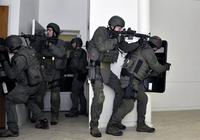-
Fashion scouts and cops: the logic behind stop-and-frisk
New research compares practices used by fashion industry casting directors to the New York City Police Department’s controversial stop-and-frisk program. Fashion casting directors belong to a select group of mediators responsible for shaping the pool of modeling talent by scouring familiar territory for the young and beautiful. These casting directors had been similarly indoctrinated into the industry and the talent they would choose often resulted in over-representation of certain kinds of people. Similarly, police officers are a select group responsible for making a city safer. Their training — reinforced daily through the institutionalization and public acceptance of such practices — disposes them to scour familiar geographical and social territory for potential criminals, often resulting in over-representation of people from certain groups.
-
-
Security agencies concerned about plastic guns
The Undetectable firearms Act of 1988, which makes it illegal to manufacture, import, sell, ship, deliver, process, transfer, or receive a firearm which is not detectable by walk-through metal detection, is set to expire on 9 December 2013. If Congress fails to reauthorize the law, plastic guns will no longer require metal components which are detectable by metal detectors. “When these 3D firearms are manufactured, some of the weapons can defeat normal detection such as metal detectors, wands, and it could present a problem to public safety in a venue such as an airport, an arena, a courthouse,” says ATF assistant director Richard Marianos.
-
-
Local enforcement of immigration law does not achieve intended goals
A new study found that when local law enforcement agencies begin to inquire immigrants about their immigration status, some immigrants relocate within the United States but few go back relocate to their home country. Those who move to other states tend to be educated – and legally in the United States. The only exception is Arizona’s Maricopa County — which made a name for itself owing to Sheriff Joe Arpaio’s controversial approach to immigration policies — where immigrants are likely to leave the country, perhaps due to unusually intense enforcement and a short distance to the border.
-
-
Ohio lawmakers want to limit use of drones by law enforcement
State lawmakers in Ohio want to limit the use of drones by law enforcement agencies in the state.A proposed bill would require law enforcement to obtain a search warrant before using drones. It would prohibit law enforcement from using drones to search for missing persons, locate illegal marijuana operations, or perform several actions officers currently handle with helicopter surveillance.
-
-
Wrong crowd: social networks are key to city violence
A new study of gun violence in Chicago reveals that a person’s social network is a key predictor in whether an individual will become a victim of gun homicide, even more so than race, age, gender, poverty, or gang affiliation. “Risk factors like race and poverty are not the predictors they have been assumed to be,” one of the researchers said. “It’s who you hang out with that gets you into trouble. It’s tragic, but not random.”
-
-
Rochester, Minn. wants to stop crime before it happens
The Rochester Police Departmentin Rochester, Minnesota is using IBM’s Infosphere Identity Insightto predict, and combat, crime. InfoSphere Identity Insight is used to identify frequent crime offenders, and even when multiple false identifications belonging to one individual are stored on record, the associated relationships of those identities could lead to the correct individual.
-
-
DHS: conspiracy theories about DHS purchases unequivocally false

Conspiracy theorists have pointed to several DHS solicitations for gear and ammunition as “proof” that the department is in the process of creating, training, and equipping a secret force, the purpose of which would be to suppress public dissent – or worse: one blogger wrote that “Another possible conclusion [regarding DHS’s ammo purchases] is that the bullets are intended to coerce and, if need be, kill us.” DHS flatly rejects these conspiratorial assertions as unequivocally false, saying that each and every purchase is in line with past purchases and in support of on-going, legitimate, and transparent departmental operations.
-
-
ShotSpotter helps Washington, D.C. police track gunshots
Law enforcement officers in Washington, D.C are better equipped to track and monitor gunshots in the city’s most violent neighborhoods by using ShotSpotter, a system of rooftop sensors which recognizes sounds from gunfire. Law enforcement officials can track shooting incidents and also predict locations and time of future shooting incidents by analyzing records provided by ShotSpotter.
-
-
Cool technology from DHS
The U.S. Department of Homeland Security (DHS) employs more than 240,000 people in a variety of areas and activities, from border security and aviation to emergency response and cybersecurity, plus everything in between. Many may not be aware of the fact that DHS has also been busy developing some cool, high-tech, life-saving gear to protect people before, during, and following disasters and emergencies.
-
-
U.S. tech companies increase lobbying efforts related to surveillance, NSA
Technology firms Apple, Google, Facebook, and Microsoft, among other tech powerhouses, are quietly increasing lobbying efforts directed at government surveillance laws as they seek to have a say in what Congress does regarding surveillance reforms and National Security Agency (NSA) programs. Traditionally, tech firms have not pushed for restrictions on the ability of the U.S. intelligence community to collect data, and it is not clear what position these industry leaders will take, whether they plan to take a position at all, or whether they will present lawmakers with a united industry front.
-
-
Fighting al-Shabab’s recruitment efforts in U.S. Somali community

Somali community organizations in the Minneapolis-St. Paul area are taking a proactive approach to the war against terrorist recruitment in America’s Somali community. “Given our support for the African peacekeeping mission, and the fact that the U.S. remains a top al Qaeda target, we need to get ahead of al-Shabab’s efforts to radicalize vulnerable youth,” House Foreign Affairs Committee chairman Representative Ed Royce (R-California) said in his opening remarks at the hearing on the subject earlier this month.
-
-
Man arrested in connection with LAX dry ice bombs
Four dry ice bombs were planted in restricted area of LAX Sunday and Monday. Two bombs exploded, causing no injury or damage, and two were found before they exploded. The LAPD announced it had arrested 28-year-old Dicarlo Bennett, an LAX employee of one of the airport’s ground crew contractors, Servisair. The LAPD chief says the police and FBI believe there was “no nexus” between the bombs and terrorism, but that the incident is related to a labor dispute.
-
-
Calif. Gov. Brown vetoes restrictive assault weapon measures
Governor Jerry Brown of California, saying that “The state of California already has some of the strictest gun laws in the country,” on Friday vetoed two measures which would have restricted the sale and possession of some semi-automatic assault weapons, and two other measures which would have tightened firearms reporting requirements and denied guns to DUI offenders. The governor’s vetoes derailed the most sweeping gun legislation measures to be considered so far this year by the California legislature. Brown signed several smaller pieces of gun legislation into law on Friday.
-
-
German neo-Nazis targeted Chancellor Gerhard Schröder for assassination

Beate Zschäpe, the last surviving members of the National Socialist Underground, a violent German neo-Nazi group, is on trial this month for taking part in the murders of eight Turkish immigrants, one Greek man, and a German policewoman, in addition to participating in fifteen bank robberies and two bomb attacks. In testimony Monday, a police investigator said that computer files found in an apartment used by NSU member indicate that in 2002, the group was working on a plot to assassinate the then-chancellor Gerhard Schröder.
-
-
Predicting violence among psychopaths no more accurate than tossing a coin
Risk assessment tools used to predict prisoner re-offending are no more accurate than tossing a coin when it comes to psychopaths, according to new research. The researchers say the findings — which also show the tools perform at best moderately in those with depression, drug and alcohol dependence, and schizophrenia — have major implications for risk assessment in criminal populations.
-
- All
- Regional
- Water
- Biometrics
- Borders/Immig
- Business
- Cybersecurity
- Detection
- Disasters
- Government
- Infrastructure
- International
- Public health
- Public Safety
- Communication interoperabillity
- Emergency services
- Emergency medical services
- Fire
- First response
- IEDs
- Law Enforcement
- Law Enforcement Technology
- Military technology
- Nonlethal weapons
- Nuclear weapons
- Personal protection equipment
- Police
- Notification /alert systems
- Situational awareness
- Weapons systems
- Sci-Tech
- Sector Reports
- Surveillance
- Transportation
Advertising & Marketing: advertise@newswirepubs.com
Editorial: editor@newswirepubs.com
General: info@newswirepubs.com
2010-2011 © News Wire Publications, LLC News Wire Publications, LLC
220 Old Country Road | Suite 200 | Mineola | New York | 11501
Permissions and Policies
Editorial: editor@newswirepubs.com
General: info@newswirepubs.com
2010-2011 © News Wire Publications, LLC News Wire Publications, LLC
220 Old Country Road | Suite 200 | Mineola | New York | 11501
Permissions and Policies
